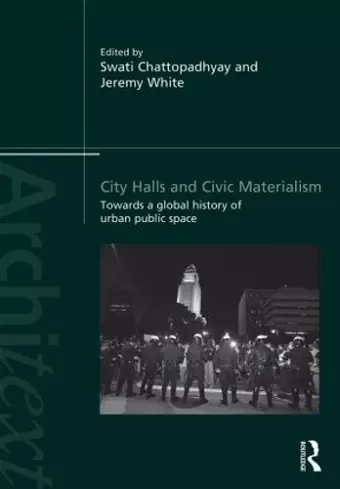City Halls and Civic Materialism
Towards a Global History of Urban Public Space
Jeremy White editor Swati Chattopadhyay editor
Format:Hardback
Publisher:Taylor & Francis Ltd
Published:10th Mar '14
Currently unavailable, our supplier has not provided us a restock date

The town hall or city hall as a place of local governance is historically related to the founding of cities in medieval Europe. As the space of representative civic authority it aimed to set the terms of public space and engagement with the citizenry. In subsequent centuries, as the idea and built form travelled beyond Europe to become an established institution across the globe, the parameters of civic representation changed and the town hall was forced to negotiate new notions of urbanism and public space.
City Halls and Civic Materialism: Towards a Global History of Urban Public Spaceutilizes the town hall in its global historical incarnations as bases to probe these changing ideas of urban public space. The essays in this volume provide an analysis of the architecture, iconography, and spatial relations that constitute the town hall to explore its historical ability to accommodate the "public" in different political and social contexts, in Europe, Asia, Australia, Africa and the Americas, as the relation between citizens and civic authority had to be revisited with the universal franchise, under fascism, after the devastation of the world wars, decolonization, and most recently, with the neo-liberal restructuring of cities.
As a global phenomenon, the town hall challenges the idea that nationalism, imperialism, democracy, the idea of citizenship – concepts that frame the relation between the individual and the body politic -- travel the globe in modular forms, or in predictable trajectories from the West to East, North to South. Collectively the essays argue that if the town hall has historically been connected with the articulation of bourgeois civil society, then the town hall as a global spatial type -- architectural space, urban monument, and space of governance -- holds a mirror to the promise and limits of civil society.
"Contributors offer valuable discussion of the post–WW II German Rathaus as an attempt to deal with an "uncertain" national identity and provide a good examination of architecture in the service of Mussolini’s Fascist state. A welcome global approach that features material on Bombay, Jakarta, Mexico, and Korea is revealing, especially on the influence of colonialism; however, more could have been said about sources of indigenous, pre-European civic engagement. Endnotes and numerous, adequate, black-and-white illustrations are provided but no bibliography. Although this volume shows the inevitable fragmentation typical of such an enterprise, the attention to unfamiliar themes and innovative approaches means that this book will interest serious students of civic architecture.Summing Up: Recommended"--W. S. Rodner, Tidewater Community Colleg, CHOICE Reviews, January 2015
ISBN: 9780415819008
Dimensions: unknown
Weight: 770g
332 pages